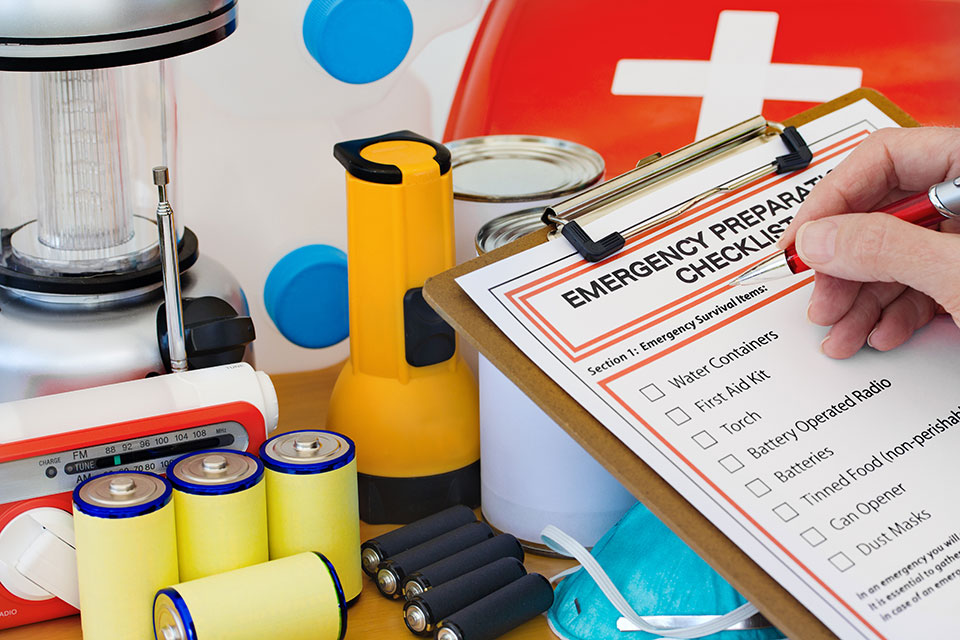"When an emergency happens, you can't respond in an effective way unless you have prepared in advance," says Ben Hippen, an emergency physician in the San Francisco Bay Area." No one can predict a specific crisis, but you can make preparations to mitigate the effects of likely disasters."
Write an Emergency Preparedness Plan
Emergencies take many forms: weather, fire, negligence, crime, etc. Having a general plan that helps you and your employees stay safe is critical. Here's what you need to get started:
- Identify regulations and code requirements involving safety and risk
- Collect information about hazards and assess risks using the Red Cross ReadyRating program
- Investigate how to prevent the hazards and reduce the risks you identify
- Do a business impact analysis to understand how these hazards affect your business
This information provides the foundation for your plan, which the Centers for Disease Control and Prevention says should cover:
- Resource management
- Emergency response
- Crisis communications
- Business continuity
- Information technology
- Employee assistance
- Incident management
- Training
At the very least, establish:
- Escape routes and meeting places in case of fire, flood or other emergency
- A plan for reaching all employees, onsite and off
- An emergency response team representative in each department and site
- Fire safety equipment and an emergency kit that includes flashlights, batteries, bottled water and a first aid kit with bandages and OTC medications. Check out recommended emergency kit contents from the Occupational Safety and Health Administration.
Building the plan can be time-consuming, but it’s important. “There are some who feel that it’s a waste of time, planning for something that may never happen,” says Hunter Frederick. His company, Frederick & Associates, helps businesses create emergency preparedness plans. “This plan is used to save lives and the information gathered will greatly impact the company and its employees if an emergency happens.”
You don't have to start from scratch. “Your local fire department and public health department are great places to start,” Hippen says. “Another valuable resource is the CDC's Emergency Preparedness for Business page.” Your insurance broker also is a helpful partner, and industry trade associations and your local Chamber of Commerce likely have experts and resources to make it easier—just ask.
“You don’t have to have a perfect emergency preparedness plan,” Hippen says. “Having any plan at all versus no plan can make all the difference when disaster strikes.”
Communicate the Plan
It can be hard to get employees to pay attention to emergency plans and drills. “We tend to respond based on how severe and probable we perceive the threat,” says David Wilkie, principal of TeamReadiness®, a Chicago-based knowledge capture and sharing company that documents job-specific knowledge. “Like the boy who cried wolf, we are conditioned to ignore the warnings. We tend to pay more attention when we have specific duties to perform, and if we believe others will be watching us and depending on us to perform those duties.”
Your message has a better chance of being heard when sent over a variety of channels and in many media (i.e., posters, emails, videos, etc.). Gail Wert, southeast region office manager for Flatiron Constructors in Morrisville, NC, sends emails and posts notices in the breakroom or on the shared server. She also speaks to employees individually to help them “understand that when there is an emergency these procedures are in place to protect them, keep them alive. Until an emergency does occur, some employees don’t understand how important these procedures are,” she says.
Instructing Employees During an Emergency
After you communicate the plan, be sure those in charge know how to direct employees in an actual emergency. Dennis Mileti, former director of the National Hazards Center, studied the time between when people receive a warning or alert and then when they actually follow it. His research shows the best way to get employees’ attention in an emergency is to tell employees:
- What to do and how to do it
- When to start and end the protective action
- Where to go and which departments and sites are affected, and where emergency supplies like first aid kits and fire extinguishers are located
- Why the action is important and how it affects your personal safety
- Who is asking them to do this (more effective coming from an authoritative and confident individual rather than a group)
Keep the communication concise, simple and specific—you don’t want people delayed while they try to figure out what to do when action is required.
Practice the Plan
Do emergency evacuation drills and provide training and refreshers regularly, preferably quarterly. At the same time, check smoke detector batteries and operation (even for hard-wired units), restock or replace first-aid kit and emergency response kit supplies (many carry expiration dates) and monitor fire extinguisher charges. Make it a companywide event, not just another boring drill.
“Safety is everyone’s concern,” says Ernest Grant, outreach coordinator for the NC Jaycee Burn Center in Chapel Hill, NC. “Keep in mind that you’re not only dealing with your life, but the lives of your fellow employees and their families.”
Margot Carmichael Lester
Quill® Contributing Writer
Margot Carmichael Lester is a business writer who grew up in a family-owned small business. She is the person in charge of emergency preparedness at The Word Factory, a creative enterprise she's owned for 21 years. Her clients include the Los Angeles Business Journal and The Vasculitis Foundation, among other organizations.


